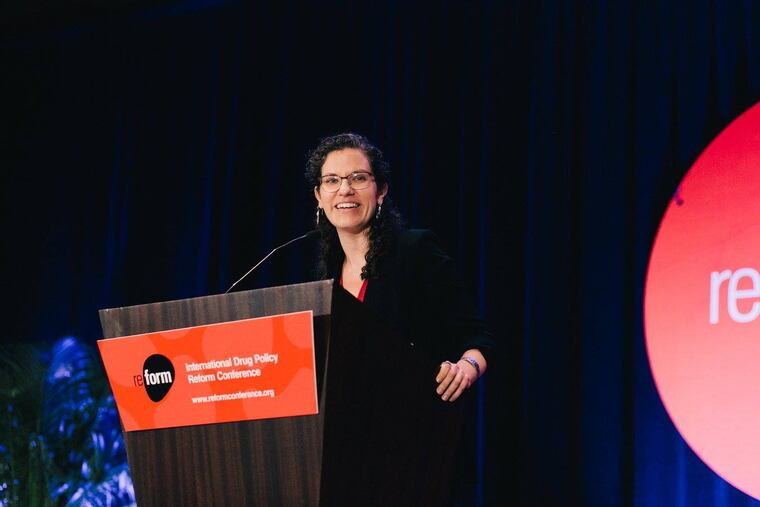Legalize marijuana to beat Pennsylvania’s opioid crisis | Opinion
Legal marijuana is no silver bullet when it comes to the overdose crisis, but it’s a common-sense policy that would recognize how intimately public health, safety, and our criminal justice system are intertwined.

Too many Pennsylvanians are dying. The state has one of the highest rates of drug overdose in the country, at 44 per 100,000 as of 2017. That’s more than four times the rate of traffic fatalities in Pennsylvania, and puts the state just slightly behind West Virginia and Ohio in overdose deaths. Yet until recently, it seemed that one simple measure that could help to reduce overdose rates was off the table: legalizing marijuana for adult use.
Now, with nearly 60 percent of Pennsylvanians supporting marijuana regulation, lawmakers in the House and Senate poised to introduce legalization bills, and Gov. Tom Wolf expressing interest in the idea, it is time to act. Legalizing marijuana would not only have the potential to reduce overdose; it would also bring a host of other health benefits.
While addressing overdose requires a multipronged strategy, recent studies indicate states that provide genuine access to legal marijuana have lower rates of opioid prescribing for chronic pain in communities that are at high risk of opioid use disorder and overdose deaths and, as a result, may see decreased rates of opioid overdose.
Merely removing criminal penalties for medical marijuana is not enough. Research indicates that these opioid-related benefits are dependent on patients’ ability to meaningfully access marijuana legally. Accordingly, medical-marijuana regimes that tightly restrict access are less likely to generate benefits, while states that have legalized marijuana entirely may see an even greater impact. After Colorado legalized marijuana and allowed retail sales in 2014, for example, opioid-related deaths declined in the state, reversing the decades-long upward trend of overdoses.
» Do you think marijuana should be legalized? Share your thoughts at opinion@philly.com. Please include your full name, location (neighborhood or town) and contact info. Some answers may appear in the Inquirer and on Philly.com.
Pennsylvania allows only limited forms of marijuana for medical use and for only certain conditions. Legalizing marijuana for adult use would significantly increase access to this lifesaving alternative to opioids.
Some policymakers might say that Pennsylvania needs to work out the kinks in the medical-marijuana system before legalizing marijuana for adult use. But while that might intuitively sound right, addressing medical and adult use marijuana together actually presents an opportunity to harmonize the two systems in a way that benefits both patients and larger communities. There’s no benefit to maintaining marijuana prohibition and the harms it is causing in order to pursue reform in a piecemeal fashion.
Legalization’s opponents often argue that even if legal marijuana has the potential to reduce overdose, it will lead to other health problems. But as my organization, the Drug Policy Alliance, has documented, the dire predictions of the critics have not materialized in states that have legalized.
For example, when voters backed a ballot initiative in 2012 to make Colorado the first state in the U.S. to legalize marijuana, critics charged that kids would have more access to marijuana, we would see more DUIs, and consumption would go through the roof. Instead, six years later, marijuana youth use rates and DUI arrests have both actually gone down. In fact, the only population whose consumption has spiked is senior citizens— many of whom may be using marijuana medically to deal with pain, insomnia, or other ailments. We’ve seen similar outcomes in Oregon, Washington, Alaska, and more.
There are other health benefits, too. By regulating the marijuana market — instead of leaving marijuana to the wholly unregulated, illegal economy — states that have legalized are better able to control the quality and safety of marijuana products, labeling, sales, and other practices that can impact health. By legalizing, Pennsylvania has an opportunity to implement smart regulations that will create much safer conditions than the existing unregulated market.
A critically important health benefit of legalization is the associated drop in marijuana arrests in states that have legalized. Arrests and convictions, even for low-level offenses, often carry dramatic consequences that can last a lifetime and that we know impact health: imprisonment, barriers to housing and employment, separation from family, loss of access to health care, and more. In Pennsylvania, legalization would mean that tens of thousands of people every year, disproportionately black and brown, and many of them young people, would no longer have their lives derailed simply because they chose to consume marijuana. Legalization would also allow Pennsylvania to direct the tax revenue from marijuana legalization in ways that improve health, including by investing in the communities that have been most harmed by prohibition.
Legal marijuana is no silver bullet when it comes to the overdose crisis, but it’s a commonsense policy that would recognize how intimately public health, safety, and our criminal justice system are intertwined. Given its proven effectiveness, there’s every reason to act now.
Maria McFarland Sánchez-Moreno is executive director of the Drug Policy Alliance. @MMcFarlandSM